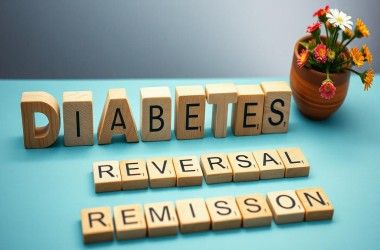Diabetes Management
What is Diabetes Reversal? The Truth About Remission
2 min read
By Apollo 24|7, Published on - 22 August 2024
Share this article
0
0 like

Imagine feeling energised, managing your weight effectively, and potentially ditching diabetes medication. Sounds too good to be true, right? Well, for type 2 diabetes, achieving a state of remission, often referred to as "reversal," might be possible. Let's dive into what diabetes reversal truly means and how it can transform lives.
What is Diabetes Reversal?
- Diabetes reversal refers to achieving normal blood sugar levels and maintaining them without the need for medications typically used to manage diabetes.
- It involves lifestyle modifications, including dietary changes, exercise, weight loss, and sometimes medication adjustments.
- Reversal doesn't mean a permanent cure, but rather achieving control over diabetes to the extent that medications may not be necessary, and complications can be minimised.
How Does Diabetes Reversal Work?
- Diet plays a crucial role, emphasizing whole foods such as fruits, non-starchy vegetables, lean proteins, and healthy fats while minimizing processed foods, sugar, and refined carbs.
- Regular exercise and being physically active throughout the day help improve insulin sensitivity, allowing cells to utilize glucose for energy better.
- Weight loss, particularly abdominal fat, can significantly improve insulin resistance and blood sugar control.
- Mental health & stress management, smoking cessation, avoidance or controlled alcohol consumption also have an important role in blood sugar control.
- Medications may need adjustment or even discontinuation under medical supervision as blood sugar levels improve.
Is Diabetes Reversal Possible for Everyone?
- Diabetes reversal is more achievable for those with type 2 diabetes, especially in the early stages.
- Factors such as duration of diabetes, overall health, and individual response to lifestyle changes influence the likelihood of reversal.
- However, even those with advanced diabetes can benefit from lifestyle changes, leading to better blood sugar management and reduced complications.
Conclusion:
Diabetes reversal is not just a dream; it's a tangible reality for many. By making simple yet profound lifestyle changes, individuals with diabetes can take control of their health and potentially reduce or eliminate the need for medications. Remember, it's never too late to start on the path to reversal. Consult with your healthcare provider or enrol now in the Apollo 24|7’s Super6 Diabetes Reversal Program to get a personalized plan that works for you, and take charge of your health today!
Diabetes Management
Consult Top Diabetologists
View AllLeave Comment
Recommended for you

Diabetes Management
Is Poha a Better Alternate than Rice?
Poha (flattened rice) is a better choice than white rice for diabetes. With a low GI (38-64) and high fiber, it minimizes blood sugar spikes. Fiber slows carb digestion, aiding blood sugar control. Nutrient retention, easy digestion, and versatility make it a nutritious option, emphasizing moderation and monitoring individual responses.

Diabetes Management
Why is Frequent Urination a Sign of Diabetes Insipidus?
Frequent urination in diabetes insipidus results from ADH deficiency or resistance, disrupting water retention in kidneys. Unlike diabetes mellitus, it causes dilute urine production and increased thirst. Without sufficient ADH, dehydration occurs. Diagnosis requires specialized tests, and treatment typically involves hormone replacement medications. Prompt medical attention is crucial for effective management.

Diabetes Management
Diabetes And Endurance Sports: Training Tips
For individuals with diabetes, endurance sports don't have to be off-limits. You can enjoy these activities by regularly monitoring blood sugar levels, maintaining a consistent training routine, and making smart nutrition choices while keeping your health intact. Wear a medical ID and inform someone before your workout session that you are a diabetic, which helps to manage hypoglycemia. Adjust insulin doses under medical supervision and carry glucose for emergencies for safety.
Subscribe
Sign up for our free Health Library Daily Newsletter
Get doctor-approved health tips, news, and more.
Visual Stories

8 Fruits That are Incredibly Healthy for Diabetes
Tap to continue exploring
Recommended for you

Diabetes Management
Is Poha a Better Alternate than Rice?
Poha (flattened rice) is a better choice than white rice for diabetes. With a low GI (38-64) and high fiber, it minimizes blood sugar spikes. Fiber slows carb digestion, aiding blood sugar control. Nutrient retention, easy digestion, and versatility make it a nutritious option, emphasizing moderation and monitoring individual responses.

Diabetes Management
Why is Frequent Urination a Sign of Diabetes Insipidus?
Frequent urination in diabetes insipidus results from ADH deficiency or resistance, disrupting water retention in kidneys. Unlike diabetes mellitus, it causes dilute urine production and increased thirst. Without sufficient ADH, dehydration occurs. Diagnosis requires specialized tests, and treatment typically involves hormone replacement medications. Prompt medical attention is crucial for effective management.

Diabetes Management
Diabetes And Endurance Sports: Training Tips
For individuals with diabetes, endurance sports don't have to be off-limits. You can enjoy these activities by regularly monitoring blood sugar levels, maintaining a consistent training routine, and making smart nutrition choices while keeping your health intact. Wear a medical ID and inform someone before your workout session that you are a diabetic, which helps to manage hypoglycemia. Adjust insulin doses under medical supervision and carry glucose for emergencies for safety.



